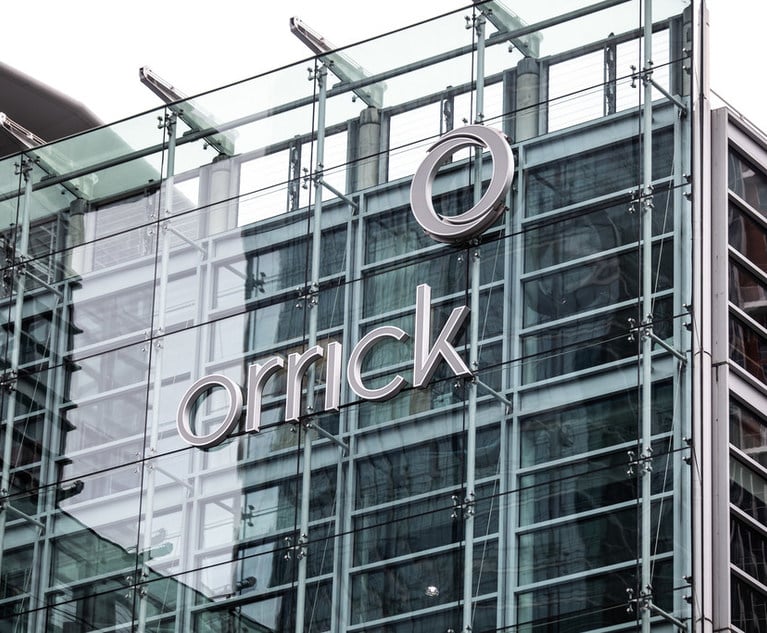Q&A: Lieff Cabraser's Kelly Dermody on Gender-Pay Cases, Arbitration & More
"Going forward, I think there will be renewed efforts to create pay transparency laws, including requiring employers to publish pay ranges and midpoints so workers have an idea of where their own pay falls," Kelly Dermody says in a wide-ranging Q&A.
June 01, 2018 at 12:34 PM
8 minute read
 Kelly Dermody
Kelly DermodyKelly Dermody says she sees a moment now where forces are aligning. It's not just in the courts, where she has been fighting some of the biggest labor and employment class actions, but also within a cultural movement that's putting a greater demand on companies to level playing fields.
As partner and chair of the employment practice group at Lieff Cabraser Heimann & Bernstein, Dermody, based in San Francisco, is working on equal pay and promotion class actions against Goldman Sachs, Google Inc. and Microsoft. She has two decades of experience tackling systematic issues in the corporate world.
The Goldman Sachs case, which contends the financial institution had an unfair playing field for women, was certified as a class action in March after a roughly eight-year battle. The attorneys are preparing for trial.
The U.S. Supreme Court decision in Epic Systems v. Lewis, however, could limit the number of class actions. The court's 5-4 ruling last month upheld as lawful collective action waivers in employment contracts that call for arbitration.
Still, Dermody predicts less arbitration and greater transparency over the next five years. The attorney spoke with The Recorder, both via phone and in email, to shed light on her view of this current moment. The following is edited for length and clarity.
The Recorder: What's next for arbitration and class action waivers after the Supreme Court's Epic Systems ruling?
Dermody: Pre-dispute mandatory arbitration clauses have been actively used as an obstacle to employees getting their day in court for the last 20 years. This is not a new environment. Companies have been overreaching with mandatory arbitration for a long time. This overreach will still happen, and some arbitration clauses will still be struck down. But we have hit a high watermark with this Supreme Court case that seems to bless a unique and horrible American practice that denies significant employee rights. This practice is not something that happens to workers around the world.
While the legal climate may look more grim, there is a shifting culture of feedback in social media and the consumer market. People are saying, “Wait a minute. Workplace secrecy is a really terrible thing for employees.” And it's not just a terrible thing for workers individually, it's a bad thing for society. By having these clauses you basically hide serial predators from view. Culturally, we are done with protecting serial predators who operate in plain sight because no one knows their history. I see that attitude shift now in the reaction of law schools and their students. Summer associates resisted being asked to sign mandatory arbitration agreements for an internship law firms. Students and schools said, “No, this is crazy.” And you can be sure, if that cram-down is happening to students at Harvard Law School, it's happening to low-wage workers in service jobs and everywhere else. You are talking about sweeping really bad social problems and even potential criminality under the rug. Time's up on arbitration too.
➤➤ Get employment law news and commentary straight to your in-box with Labor of Law, a new Law.com briefing. Learn more and sign up here.
How will you get around that “high watermark” in the work you do?
The problem for employers is their workforces are getting more savvy and there is much more pushback against these clauses. You don't see pre-dispute mandatory arbitration for EEO claims in other parts of the world. Consumers are also flexing their collective power to get companies to examine equity across many practices, including misconduct secrecy. People want to have more transparency and accountability, and we understand that what is visible gets addressed. As time goes on, I think you will see more and more employers abandon this practice or elect not to enforce arbitration in litigation because of pressure from their workforce or the public. I have already seen that happen in some of my cases.
How important is the public setting for any inspiration to workplace changes?
I think the culture shapes the cases—like how the #MeToo movement has inspired more women to demand justice for sexual violence—but sometimes the cases shape culture as well. When you have impact litigation success, it doesn't just affect your clients and their employers, it affects how other companies think about their practices and how other employees reflect on their own worth and dignity. Those are things you can't measure.
When we have success we hope we provide a lift to those who come after us. That's the joy of the long work. In employment class action work, there is a constant evolution of litigation strategies, as one side ramps up on something and the other side ramps up on something else. The law changes and companies evolve. Expert work has become so precise. We are more sophisticated in identifying system failures. But there are a lot of common bad practices out there, and a lot of work to do be done right now.
What progress have you seen in this area?
The combination of social media shining a light on bad actors and the credibility that has attached to women's stories has been powerful. I think women now have a greater sense of confidence that they will be believed when they tell their stories, and a greater propensity to externalize the misconduct directed at them, to expect and demand better treatment and accountability from employers. My hope is that employers will actually listen better and intervene much more quickly and effectively than in the past. Unfortunately, in many places, human resources is still a joke.
What are some of the biggest issues and policies that might allow bad behavior to persist?
It starts with HR. When people come and talk to me, it is almost always after a failed HR experience. Either the HR process was a sham, or there was a history of retaliation at the company that made employees unable or willing to use internal processes. And the overwhelming focus of most major companies is to shield their HR work from being exposed some day in a hypothetical future litigation rather than on ferreting out real problems in a transparent system of accountability. Companies can't fix their problems if the goal of the department is to stop the employee from being heard. Beyond the HR issues, the biggest single problem is equal pay, which isn't getting fixed on its own and needs more transparency to ensure fair outcomes. And in too many companies, the worst actors in management are considered untouchable, even if they are serial harassers or abusive to employees.
Have you seen companies willing to do pay audits?
Some do, but there is a lot of insincerity out there in the effort. Either they uncover pay differences that they don't fix or they slice the data to minimize or conceal the pattern of underpayment.
What's next for closing the gender pay gap?
What's next is more transparency. If you really want to fix pay—it's easy. Just publish everyone's pay, and the next day you will have employees lined up at HR demanding justifications for pay disparities. Since employers don't want to make pay that transparent, the onus is on employers to make sure there is fairness in the pay decisions. Going forward, I think there will be renewed efforts to create pay transparency laws, including requiring employers to publish pay ranges and midpoints so workers have an idea of where their own pay falls. You can see that happening in Europe. In the U.K., the new gender pay reporting law led to a lot of conversations, some hard ones. More transparency forces companies to do what they should have done in the first place: pay people the same for similar work and monitor results to ensure it is happening. The pushback I hear from management lawyers is, “What if we did a serious pay analysis? Then we'll just get sued by someone like you?” To that I say, what's your goal? If your goal is to study pay without fixing gaps, then yes, you'll get sued. But if your goal is fair pay, you'll fix the gaps you find and actually comply with the law.
Read more:
Prior Salary Can't Justify Gender Wage Gap, En Banc Ninth Circuit Says
Labor of Law: Pay Equity Classes Grow | Flipping Off, Then Fired
Gender-Pay Suit Against Google Seeks 'Fairness for Women'
Litigation Department of the Year, Giant Slayer: Kelly Dermody
This content has been archived. It is available through our partners, LexisNexis® and Bloomberg Law.
To view this content, please continue to their sites.
Not a Lexis Subscriber?
Subscribe Now
Not a Bloomberg Law Subscriber?
Subscribe Now
NOT FOR REPRINT
© 2025 ALM Global, LLC, All Rights Reserved. Request academic re-use from www.copyright.com. All other uses, submit a request to [email protected]. For more information visit Asset & Logo Licensing.
You Might Like
View All
Orrick Picks Up 13-Lawyer Tech, VC Group From Gunderson Dettmer

On The Move: Squire Patton Boggs, Akerman Among Four Firms Adding Atlanta Partners
7 minute read

Judge Grills DOJ on Trump’s Birthright Citizenship Executive Order
Trending Stories
- 1Sharpening Residential Insurance Fraud Defense Strategies: Insights for Insurers to Mitigate Risk in 2025
- 2Reversal of Fortune: Restoring Owners’ Equity Under New Jersey’s Tax Sale Law
- 3Black Judges Discuss Growing Up During Segregation, Efforts to Diversify the Profession
- 4As They Dissolve the Firm, Equity Partners in Houston Trial Firm Hodges & Foty Dispute Over Access to Bank Accounts
- 5How I Made Office Managing Partner: 'Always Be Willing to Work Harder Than the Person Next to You,' Says Esther Cho of Stradley Ronon
Who Got The Work
J. Brugh Lower of Gibbons has entered an appearance for industrial equipment supplier Devco Corporation in a pending trademark infringement lawsuit. The suit, accusing the defendant of selling knock-off Graco products, was filed Dec. 18 in New Jersey District Court by Rivkin Radler on behalf of Graco Inc. and Graco Minnesota. The case, assigned to U.S. District Judge Zahid N. Quraishi, is 3:24-cv-11294, Graco Inc. et al v. Devco Corporation.
Who Got The Work
Rebecca Maller-Stein and Kent A. Yalowitz of Arnold & Porter Kaye Scholer have entered their appearances for Hanaco Venture Capital and its executives, Lior Prosor and David Frankel, in a pending securities lawsuit. The action, filed on Dec. 24 in New York Southern District Court by Zell, Aron & Co. on behalf of Goldeneye Advisors, accuses the defendants of negligently and fraudulently managing the plaintiff's $1 million investment. The case, assigned to U.S. District Judge Vernon S. Broderick, is 1:24-cv-09918, Goldeneye Advisors, LLC v. Hanaco Venture Capital, Ltd. et al.
Who Got The Work
Attorneys from A&O Shearman has stepped in as defense counsel for Toronto-Dominion Bank and other defendants in a pending securities class action. The suit, filed Dec. 11 in New York Southern District Court by Bleichmar Fonti & Auld, accuses the defendants of concealing the bank's 'pervasive' deficiencies in regards to its compliance with the Bank Secrecy Act and the quality of its anti-money laundering controls. The case, assigned to U.S. District Judge Arun Subramanian, is 1:24-cv-09445, Gonzalez v. The Toronto-Dominion Bank et al.
Who Got The Work
Crown Castle International, a Pennsylvania company providing shared communications infrastructure, has turned to Luke D. Wolf of Gordon Rees Scully Mansukhani to fend off a pending breach-of-contract lawsuit. The court action, filed Nov. 25 in Michigan Eastern District Court by Hooper Hathaway PC on behalf of The Town Residences LLC, accuses Crown Castle of failing to transfer approximately $30,000 in utility payments from T-Mobile in breach of a roof-top lease and assignment agreement. The case, assigned to U.S. District Judge Susan K. Declercq, is 2:24-cv-13131, The Town Residences LLC v. T-Mobile US, Inc. et al.
Who Got The Work
Wilfred P. Coronato and Daniel M. Schwartz of McCarter & English have stepped in as defense counsel to Electrolux Home Products Inc. in a pending product liability lawsuit. The court action, filed Nov. 26 in New York Eastern District Court by Poulos Lopiccolo PC and Nagel Rice LLP on behalf of David Stern, alleges that the defendant's refrigerators’ drawers and shelving repeatedly break and fall apart within months after purchase. The case, assigned to U.S. District Judge Joan M. Azrack, is 2:24-cv-08204, Stern v. Electrolux Home Products, Inc.
Featured Firms
Law Offices of Gary Martin Hays & Associates, P.C.
(470) 294-1674
Law Offices of Mark E. Salomone
(857) 444-6468
Smith & Hassler
(713) 739-1250






